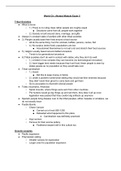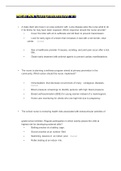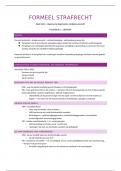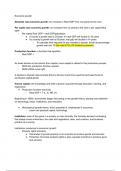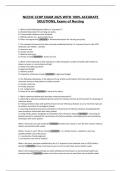1. *Q*: The principal-agent problem primarily arises due to:
- A) Economic fluctuations
- B) Asymmetric information
- C) Government regulations
- D) Market competition
2. *Q*: Which of the following is a type of agency cost?
- A) Transaction costs
- B) Bonding costs
- C) Production costs
- D) Opportunity costs
3. *Q*: What does adverse selection in corporate governance refer to?
- A) The selection of adverse business strategies
- B) The process of selecting unfavorable investment projects
- C) Hiring managers who do not act in the best interest of shareholders
- D) Choosing shareholders who are not beneficial to the company
4. *Q*: Empire building by managers refers to:
- A) Building the company’s physical assets
- B) Expanding the company beyond optimal size
- C) Constructing a corporate headquarters
- D) Establishing a royal lineage in management
5. *Q*: Perquisites enjoyed by managers can lead to:
- A) Increased shareholder value
- B) Decreased agency costs
- C) Loss of value for shareholders
- D) Improved company performance
6. *Q*: In corporate governance, monitoring costs are incurred by:
- A) The government
- B) Creditors
- C) Shareholders
- D) Customers
7. *Q*: Multi-class shares often lead to:
, - A) Equal voting rights for all shareholders
- B) Reduced voting power for certain shareholders
- C) Increased foreign investment
- D) Decreased company valuation
8. *Q*: The role of executive compensation in corporate governance is to:
- A) Reduce company expenses
- B) Incentivize short-term performance
- C) Align managers' interests with shareholders'
- D) Increase the wealth of executives
9. *Q*: Which of the following best describes moral hazard in corporate governance?
- A) Ethical behavior by managers
- B) Risky behavior due to lack of accountability
- C) Legal hazards faced by corporations
- D) Financial risks due to market changes
10. *Q*: The concept of residual loss refers to:
- A) Losses due to natural disasters
- B) Losses in investment value over time
- C) Losses incurred due to managers not acting in the best interest of shareholders
- D) Losses from discontinued operations
11. *Q*: Asymmetric information in corporate governance can lead to:
- A) Better decision-making
- B) Lower agency costs
- C) Increased transparency
- D) Principal-agent problems
12. *Q*: In corporate governance, the term "stakeholders" refers to:
- A) Only the shareholders of the company
- B) Anyone with an interest in the company’s performance
- C) Only the company’s employees
- D) Government regulators only
13. *Q*: Which of the following is not a mechanism for reducing agency costs?
- A) Increasing executive salaries
- A) Economic fluctuations
- B) Asymmetric information
- C) Government regulations
- D) Market competition
2. *Q*: Which of the following is a type of agency cost?
- A) Transaction costs
- B) Bonding costs
- C) Production costs
- D) Opportunity costs
3. *Q*: What does adverse selection in corporate governance refer to?
- A) The selection of adverse business strategies
- B) The process of selecting unfavorable investment projects
- C) Hiring managers who do not act in the best interest of shareholders
- D) Choosing shareholders who are not beneficial to the company
4. *Q*: Empire building by managers refers to:
- A) Building the company’s physical assets
- B) Expanding the company beyond optimal size
- C) Constructing a corporate headquarters
- D) Establishing a royal lineage in management
5. *Q*: Perquisites enjoyed by managers can lead to:
- A) Increased shareholder value
- B) Decreased agency costs
- C) Loss of value for shareholders
- D) Improved company performance
6. *Q*: In corporate governance, monitoring costs are incurred by:
- A) The government
- B) Creditors
- C) Shareholders
- D) Customers
7. *Q*: Multi-class shares often lead to:
, - A) Equal voting rights for all shareholders
- B) Reduced voting power for certain shareholders
- C) Increased foreign investment
- D) Decreased company valuation
8. *Q*: The role of executive compensation in corporate governance is to:
- A) Reduce company expenses
- B) Incentivize short-term performance
- C) Align managers' interests with shareholders'
- D) Increase the wealth of executives
9. *Q*: Which of the following best describes moral hazard in corporate governance?
- A) Ethical behavior by managers
- B) Risky behavior due to lack of accountability
- C) Legal hazards faced by corporations
- D) Financial risks due to market changes
10. *Q*: The concept of residual loss refers to:
- A) Losses due to natural disasters
- B) Losses in investment value over time
- C) Losses incurred due to managers not acting in the best interest of shareholders
- D) Losses from discontinued operations
11. *Q*: Asymmetric information in corporate governance can lead to:
- A) Better decision-making
- B) Lower agency costs
- C) Increased transparency
- D) Principal-agent problems
12. *Q*: In corporate governance, the term "stakeholders" refers to:
- A) Only the shareholders of the company
- B) Anyone with an interest in the company’s performance
- C) Only the company’s employees
- D) Government regulators only
13. *Q*: Which of the following is not a mechanism for reducing agency costs?
- A) Increasing executive salaries


